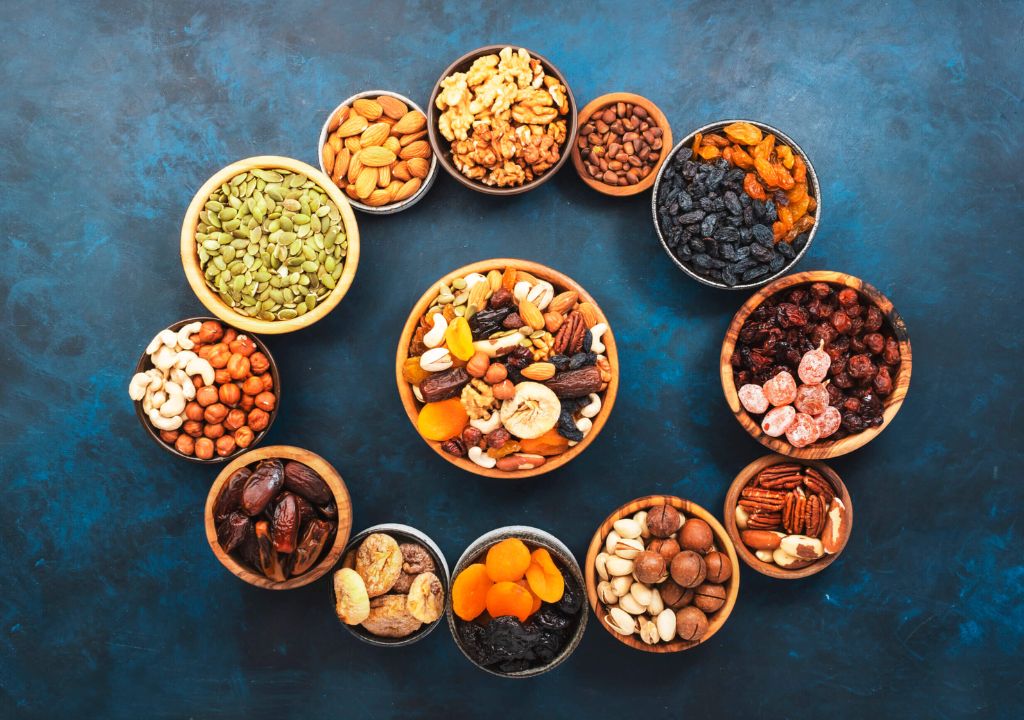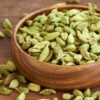
Which dryfruits, we should eat in winters?
In winter, dry fruits provide warmth, energy, and essential nutrients to help the body stay resilient against cold weather and seasonal ailments. Their nutrient density, healthy fats, vitamins, and minerals support the immune system, improve circulation, and keep you energized. Here are some of the best dry fruits to eat in winter:
1. Almonds
Almonds are packed with vitamin E, healthy fats, and antioxidants that strengthen the immune system and keep the skin hydrated, which is especially beneficial during the dry winter months. They also contain magnesium, which supports muscle health and reduces winter fatigue.
Tip: Soak a handful of almonds overnight, then consume them in the morning for better digestion and nutrient absorption.
2. Walnuts
Walnuts are rich in omega-3 fatty acids, which support brain health and help the body stay warm during colder months. Their anti-inflammatory properties protect against winter joint pain and improve heart health. Walnuts also promote skin health, helping to prevent dryness and flakiness.
Tip: Eating 4-5 walnuts daily is ideal. You can enjoy them with breakfast or sprinkle them on warm oatmeal.
3. Cashews
Cashews provide warmth to the body and are rich in magnesium, zinc, and iron, essential for immune health during winter. They are also a good source of energy and protein, which helps the body combat the lethargy that often accompanies colder weather.
Tip: A handful of cashews (about 5-7) makes a satisfying snack or can be added to winter dishes for extra flavor and nutrition.
4. Pistachios
Pistachios are nutrient-dense and provide a good balance of protein, fiber, and healthy fats. They contain antioxidants that help fight seasonal colds and boost immune health. Their fiber also aids digestion, which can be slower in colder weather.
Tip: Enjoy 15-20 pistachios as an afternoon snack or add them to winter salads and desserts.
5. Dates
Dates are naturally sweet and high in calories, making them an excellent source of quick energy. They are rich in iron, fiber, and potassium, which help improve circulation, keep the body warm, and promote healthy digestion. Dates also help curb sugar cravings in winter, offering a healthier alternative to sweets.
Tip: Eat 2-3 dates as a warming snack or add them to hot milk for a comforting winter drink.
6. Dried Figs
Dried figs are high in fiber, calcium, and antioxidants, which support immunity, aid digestion, and help maintain healthy bones during winter. Figs also provide iron and energy, helping to prevent winter fatigue and anemia.
Tip: 1-2 dried figs in the morning can be a good winter snack, or they can be added to porridge or warm cereals.
7. Raisins
Raisins are rich in iron, potassium, and natural sugars, which help maintain energy levels and improve circulation during winter. Their antioxidant properties help protect the body from winter infections, while their fiber aids digestion and keeps the gut healthy.
Tip: Add a handful of raisins to warm oatmeal, or enjoy them as a quick snack to stay energized.
8. Apricots
Dried apricots are rich in vitamin A and iron, which help improve immunity, support skin health, and prevent winter dryness. They are also good for digestion, as they contain fiber that keeps the digestive system active.
Tip: 4-5 dried apricots can be a great snack or addition to a winter fruit salad.
Winter Tips for Eating Dry Fruits
- Warm Your Body: Dry fruits can naturally generate heat in the body, making them perfect for winter. Eating them in the morning provides a warming effect and sustained energy.
- Portion Control: Since dry fruits are calorie-dense, enjoy them in moderation. A handful of mixed dry fruits daily is generally sufficient.
- Avoid Added Sugar: Select unsweetened, natural dry fruits to avoid added sugars and preservatives.
- Combine with Hot Drinks: Add dry fruits to warm milk, teas, or winter herbal concoctions for added nutrition and warmth.
Conclusion
Eating almonds, walnuts, cashews, pistachios, dates, dried figs, raisins, and apricots in winter can provide warmth, boost immunity, and help maintain energy levels. Incorporating these dry fruits into your winter diet can support your body’s needs during colder months, keeping you healthy, energetic, and protected from seasonal ailments.




